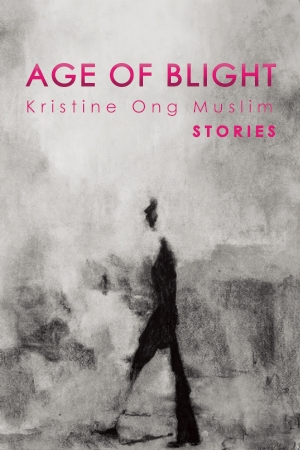Reviewed by Sauleha Kamal
—Kristine Ong Muslim, ‘Age of Blight’ (Unnamed Press, 2016)

Image courtesy of Unnamed Press
Haunting. That’s Kristine Ong Muslim’s forthcoming short story collection, ‘Age of Blight’, in one word. ‘Age of Blight’ is divided into four sections: ‘Animals’, ‘Children’, ‘Instead of Human’ and ‘The Age of Blight’. Each section features dark, speculative stories that are all ultimately grappling with the idea that the “end of man is not caused by some cataclysmic event, but by the nature of humans themselves.†Mostly set in the year 2115, these stories are united by their deft exploration of the worst of human nature. The dark future of humanity imagined in this collection is painted with strokes of reality and this sense of reality is what ultimately haunts the reader.
In ‘The Wire Mother (or Harry’s Book of Love)’, a scientist conducts—and painstakingly records—cruel “experiments†on monkeys. His sadistic, yet detached, penchant for torture becomes more chilling still with Muslim’s accurate mimicking of the language of scientific journals. Utterly horrifying, the experiments feel all too real.
In ‘The Ghost of Laika’, we hear from the spirit of the Russian space dog, whose voice is full of regret at her youthful naiveté as she recounts her joy at being “adopted†off the streets by the researchers who would launch her into space. Fed juicy steaks during the course of her training, she grows attached to her ‘owners’ and feels grateful to a “God-dog†for her good fortune. Soon, however she is locked in a capsule and “shot into space.†The image of the loyal, confused and lonely dog haunts the reader as the ghost of Laika reveals the cause of her slow death in the capsule: organs boiled due to overheating. The gravity of the betrayal of one so innocent lingers long after the last word has been read.
‘Pet’ concerns a family forced to adopt a pet under government regulations that stipulate that each family must own a pet. The various members of the family subject the pet to months of excruciating torture until it is a submissive shadow of its former self. There is no explanation for this violence other than that “it was—a creature to quench our appetite to maim other people.†This is a world where cruelty is a given and pets become the objects on which people act out their cruel impulses. Yet, heartbreakingly, in this story, the pet remains devoted to the owners, holding on to hope and goodness in a world devoid of empathy—until the twist at the end of the story. The strange premise of this piece raises all sorts of questions about human nature, empathy and morality.
Perhaps the final story in this collection best captures its philosophy about the end of the world: “Unlike in the movies, there is no dramatic thud…Minutes pass.†That is the muted apocalypse imagined in this book, propelled not by a catastrophic event but the evils within human nature itself.. Certainly not the action-packed apocalypse Hollywood has popularized with such films as Day After Tomorrow (2004) and World War Z (2013), ‘Age of Blight’’s apocalypse is a grotesque, drawn-out version of T.S. Eliot’s end-of-the-world “whimperâ€.
The stories are masterfully written, evocative and memorable, but if I had one criticism, it would be that they are a little too similar—not in material, which is varied as the characters and futures in these richly imagined stories, but in  tone. The sense of hopelessness and despair that is so potent early in the collection begins to lose its impact by the midway point. However, ‘Age of Blight’ deserves praise for its willingness to confront complex questions. If you revel in the uncanny, this is a collection you will not want to miss.




